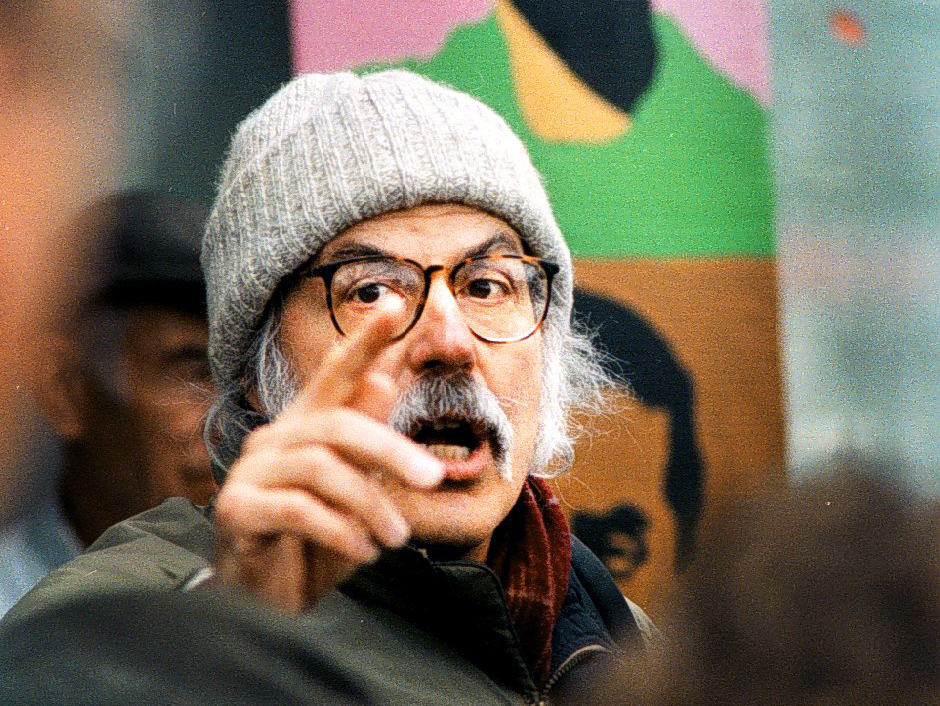Larry Bensky, who brought an activist’s level of devotion and a historian’s attention to detail to the work of radio journalism, died May 19 in Berkeley. He was 87.
The signature voice of left-leaning station KPFA, Bensky was most famous for his live broadcasts of the Iran-Contra hearings of the late 1980s, which won him the prestigious George Polk Award.
But he also covered the confirmation hearings of four U.S. Supreme Court justices, the 9/11 Commission hearings and innumerable demonstrations and protests, earning the reverence of the San Francisco Bay Area’s large leftist community. From a San Francisco phone booth, he broadcast a live narrative of the historic “White Night” riots, sparked by the lenient sentencing of Dan White for the assassinations of San Francisco mayor George Moscone and Supervisor Harvey Milk.
Bensky was born into a Jewish family in Brooklyn on May 1, 1937. He was inspired to become a journalist and an activist as a youth while reading news of the extermination of European Jews in the six or seven newspapers that his father brought home every evening, he said in a 2007 interview that aired on KPFA. He graduated with departmental honors from Yale University, where he was managing editor of the Yale Daily News.
“When I realized I had the skills to be a writer, I wanted it to be for good, and I thought that bringing people information would stir things up,” he said during the on-air interview, called Larry Bensky Retrospective. “If you don’t do it, it’s certainly not going to change.”
His career in print journalism started at the Minneapolis Star-Tribune. Then he worked as an editor at Random House, offering writer Cormac McCarthy his first book contract, before moving to France in 1964 to become Paris editor of The Paris Review.
A lifelong pacifist, in 1968 he signed the “Writers and Editors War Tax Protest” pledge, vowing to refuse tax payments in protest against the Vietnam War.
He returned to New York to join The New York Times Sunday Book Review, but left in disgust after they killed several major pieces, including a review of Bertrand Russell’s book War Crimes in Vietnam and a major magazine article about the antiwar movement. “They said I didn’t have sufficient criticism,” he griped in a 2007 interview.
He arrived in the San Francisco Bay Area during the social upheaval of 1968 to join the staff of Ramparts magazine, the most militant and freewheeling publication on American newsstands of its era.
Then he found his calling in radio. He joined the staff of the legendary underground San Francisco rock station KSAN, the soundtrack of San Francisco’s Haight-Ashbury scene, covering the Native American occupation of Alcatraz Island in 1969. On Thanksgiving Day, he motored out to the island by boat, dodging the U.S. Coast Guard to deliver a frozen turkey and other supplies. It was a story that was sent around the world.
His longtime home was Pacifica Foundation’s flagship Berkeley station KPFA, a pioneer of the countercultural airwaves, winning five Gold Reel awards from the National Federation of Community Broadcasters. For years he hosted Sunday Salon, a public affairs show with an undisguisedly political mission. He also co-anchored, with Amy Goodman, the daily Pacifica Network news show, “Democracy Now!,” as well as other interview programs.
He found himself at the center of the news in the late 1990s during an ugly power struggle over who controls what goes on the airwaves. During a fight between KPFA and the Pacifica Foundation, which owns the station, he was dismissed from his programming position. Reinstated after much listener and staff protest, and then later fired again for critical outspokeness. Instead of walking away, he helped build a national campaign that ultimately forced out network leadership.
In a graceful final act, he returned to KPFA on Sunday mornings to host a classical piano show.
Bensky continued to write throughout his career, contributing to the The Nation magazine, the Los Angeles Times Sunday Book Review and The East Bay Express.
In addition to his work as a journalist, Bensky taught classes in journalism and broadcasting at Stanford University, CSU East Bay, Berkeley City College and UC Berkeley’s Osher Lifelong Learning Institute.
A longtime Berkeley resident, he could be glimpsed pedaling his bicycle around town. He stayed engaged in musical trends, sending friends YouTube videos that ranged from Paul Simon to Kacey Musgraves. And he returned to a lifetime avocation, French language and literature, producing and hosting the website “Radio Proust.”
After news of his death, colleagues and listeners hailed Bensky for his unflappable on-air intellectual commentaries.
“A force of nature and a true giant,” said David Gans, host and producer of the nationally syndicated Grateful Dead Hour.
Radio programmer and host Bonnie Simmons described him as “prickly as a cactus. But he was the most extraordinary news and commentary person I’ve ever heard,” she said. “I never saw anyone who was able to, on his feet, moderate news during life events with such a breadth of history. He could instantly bring up facts and weave them in so you understood what you were observing.”
“I learned the magic of live radio, the power of synchronizing the attention of a large audience on a single event,” wrote KPFA “UpFront” program host Brian Edwards-Tiekert, in a Facebook tribute.
“He always wanted KPFA to be better and bigger,” he said. “And because of him, we are.”


